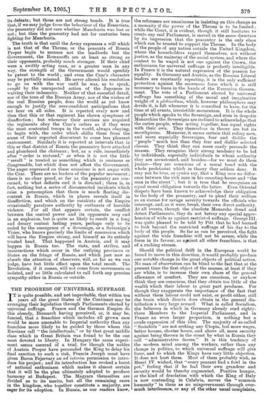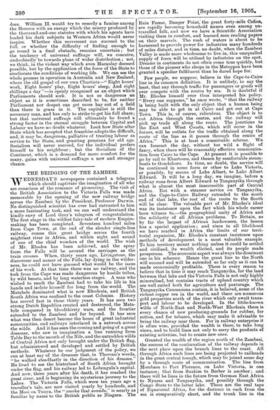THE PROGRESS OF UNIVERSAL SUFFRAGE.
IT is quite possible, and not improbable, that within ten years all the great States of the Continent may be arranging their legislation through Parliaments elected by universal suffrage. France and the German Empire do this already, Bismarck having perceived, or, it may be, fancied, that a franchise which includes all grown men would be more amenable to Imperial authority than any franchise more likely to be guided by those whom the Russians call " the intellectuals," or by that great middle class which in Great Britain was found to be the one most devoted to liberty. In Hungary the same experi- ment seems assured of a trial, for though the nobles of Austria Proper have persuaded the King to delay his final sanction to such a risk, Francis Joseph must have given Baron Fejervary an ad interim permission to intro- duce his project; and its introduction has evoked a burst of national enthusiasm which makes it almost certain that it will be the plan ultimately adopted to produce harmony at Budapest. The Magyars themselves are divided as to its merits, but all the remaining races in the kingdom, who together constitute a majority, are eager for its adoption. In Russia, as our readers know, the reformers are unanimous in insisting on this change as a necessity if the power of the Throne is to be limited ; while the Court, it is evident, though it still hesitates to create any real Parliament, is moved in the same direction by its impression that the peasantry is the only class which can be trusted to support the Throne. In the body of the people of any nation outside the United Kingdom, where the householders regard themselves, not without justice, as the mainstay of the social system, and where the contest to be waged is not one against the Crown, the enthusiasm for universal suffrage is perfectly intelligible. In France it is the natural expression of the passion for equality. In Germany and Austria, as the Russian Liberal leaders are constantly repeating, it is the only sufficient protection against the enormous force which it is still necessary to leave in the hands of the Executive Govern- ment. The vote of a Parliament elected by universal suffrage has something of the moral and imaginative weight of a plebiscitum, which, however philosophers may deride it, is felt whenever it is consulted to have, for the time at all events, irresistible momentum. It is the whole people which speaks to the Sovereign, and even in despotic Monarchies the Sovereigns are inclined to acknowledge that the entire people, when acting together, has equal rights with their own. They themselves in theory are but its mouthpieces. Moreover, it seems certain that ruling men, and more especially Sovereigns, fear and dislike the " people " much less than they fear and dislike selected classes. They think they can more easily persuade the masses. They recognise their strong tendency to be led by individuals, especially individuals to whose authority they are accustomed, and besides—for we must do them justice—they are conscious of a moral bond with the whole proletariat which in theory they seldom deny. It may not be true, as cynics say, that a King sees no differ- ence between the rich man in his countiner-house and "the man in the street"; but it is true that bhe recognises an equal moral obligation towards the latter. Even Oriental despots have been known to acknowledge their obligation to the body of the peasantry, and to plead their welfare as an excuse for savage severity towards the officials who intercept, and, as it were, break, their own direct authority. At all events, though the absolute Monarchs dread and detest Parliaments, they do not betray any special appre- hension of wide as against restricted suffrage. George III. was quite pleased to be told by Pitt that he had learned to look beyond the restricted suffrage of his day to the body of the people. So far as can be perceived, the fight against the wide franchise will not be severe, while the force in its favour, as against all other franchises, is that of a rushing stream.
Should the political drift in the European world be found to move in. this direction, it would probably produce one notable change in the great objects of political action. No man of observation can be blind to the fact that at the present time the first object of the masses, at least if they are white, is to increase their own share of the general allowance of comfort. They are conscious, or anyhow think they are conscious, that they obtain too little of the wealth which their labour in great part produces. For though they exaggerate the importance of the fact that without them labour could not exist, or profit either, still the brain which directs does obtain in the general dis- tribution a very large reward. What is called Socialism, the believers in which in Germany already send eighty- three Members to the Imperial Parliament, and in France an even larger proportion, is nothing but a crude expression of this idea. The majority of so-called " Socialists " are not seeking any Utopia, but more wages, better houses, shorter hours, and above all, more security against being thrown in the street by what in Russia they call " administrative decree." It is this tendency of the modern mind among the workers, rather than any change in politics, to which universal suffrage will give force, and to which the Kings have very little objection. It does not hurt them. Most of them probably wish, as Henri IV. wished, that "every peasant had a fowl in the pot," feeling that if he had their own grandeur and security would be thereby augmented. Positive hunger, or the kind of desolation with which the King of Italy is now contending in Calabria, moves the " common humanity" in them as no misgovernment through over- much interference, or any of the other usual complaints, does. William II. would try to remedy a famine among the Hereros with an energy which the misery produced by the thousand-and-one statutes with which his agents have loaded his dark subjects in Western Africa would never inspim Whether this movement can succeed to the full, or whether the difficulty of finding enough to go round is a final obstacle, remains uncertain ; but the tendency of universal suffrage will, we conceive, undoubtedly be towards plans of wider distribution ; not, we think, in the violent way which even Macaulay deemed possible, but by the application of the force of the State to ameliorate the conditions of working life: We can see the whole process in operation in Australia and New Zealand, where the old gospel of our own Chartists—" Eight hours' work, Eight hours' play, Eight hours' sleep, And eight shillings a day "—is openly recognised as an object which Parliaments should seek. It is not so dangerous an object as it is sometimes described to be, for neither Parliament nor despot can get more hay out of a field than there is grass in it. The capitalist is still the necessary man, and has only to strike to get his full share; but that universal suffrage will ultimately be found a strong factor in the eternal struggle between Capital and Labour we have no doubt whatever. Look how State after State which has accepted that franchise adopts the difficult, and, it may be, dangerous, palliative of treating labour as service to the State, and granting pensions for old age. Socialism will never succeed, for the individual prefers himself to his neighbour ; but the Socialism of the Continent, which is a demand for more comfort for the many, gains with universal suffrage a new and stronger chance.











































 Previous page
Previous page